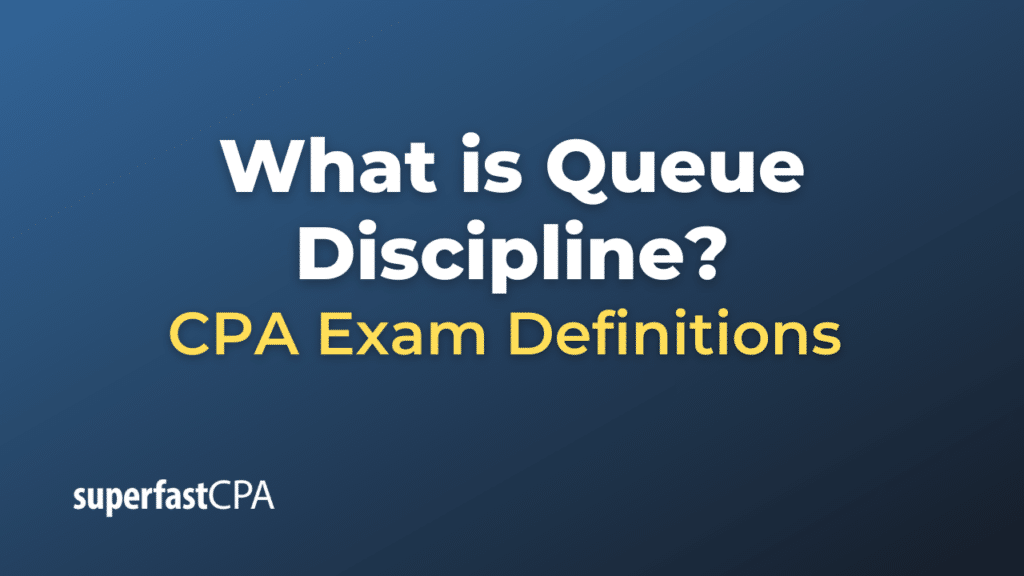Queue Discipline
Queue discipline refers to the set of rules or protocols that determine the order in which members of a queue (or line) are served. Queue discipline is crucial in many areas, especially in operations research, computer science, telecommunications, and transportation, as it can significantly impact the efficiency, fairness, and overall performance of a system.
There are various queue disciplines, and the choice of which one to use often depends on the specific scenario, system goals, or fairness criteria. Some of the most common queue disciplines include:
- First-Come, First-Served (FCFS) or First-In, First-Out (FIFO): This is the most common and intuitive discipline. The first entity (like a customer or data packet) that enters the queue is the first to be served. Think of people standing in line at a grocery store checkout.
- Last-Come, First-Served (LCFS) or Last-In, First-Out (LIFO): The last entity to enter the queue gets served first. This is less common in everyday scenarios but might be seen in certain computational or storage contexts.
- Priority Queue: Entities are served based on their priority rather than their position in the queue. For instance, in emergency rooms, patients with life-threatening conditions are treated before those with less severe issues, regardless of arrival time.
- Round Robin: This discipline cycles through the queue, serving each entity for a set time or service level before moving on to the next. It’s common in computer scheduling where processes take turns being executed.
- Shortest Job First (SJF): Entities with the shortest expected service time are prioritized. This can minimize the total time entities spend in the system but might lead to longer tasks waiting indefinitely.
- Random Selection: As the name suggests, entities are served in a random order. It’s not common in everyday scenarios but can be applied in some computational or network systems.
The choice of queue discipline can greatly affect the performance of a system, especially when it comes to metrics like average wait time, system utilization, and fairness. Often, the best discipline will depend on the specifics of the system being considered and the objectives to be achieved.
Example of Queue Discipline
Let’s delve into a few real-life scenarios to illustrate different queue disciplines.
- First-Come, First-Served (FCFS):
- Scenario: At a local bakery, customers line up to buy fresh bread every morning. The first customer to arrive is the first to be served, and so on. If you arrive earlier, you’ll get your bread faster. This method is straightforward and usually seen as fair in such contexts.
- Priority Queue:
- Scenario: In an emergency room (ER), patients are triaged based on the severity of their conditions. A patient with a heart attack will be treated before someone with a sprained ankle, even if the latter arrived earlier. This system ensures that critical cases get immediate attention, potentially saving lives.
- Round Robin:
- Scenario: Consider a group of workers who are sharing a single piece of machinery in a workshop. Each worker gets to use the machine for 30 minutes before passing it on to the next person. After all workers have had their turn, the cycle starts again. This ensures that everyone gets equal access.
- Shortest Job First (SJF):
- Scenario: Imagine a print shop where customers come in with varying numbers of pages to print. To minimize the total waiting time, the shop serves customers with the fewest pages first. So, if you have two pages and another person has fifty, your job will be printed ahead of theirs.
- Random Selection:
- Scenario: An online ticketing system for a highly anticipated concert might randomly select users from a virtual waiting room to purchase tickets. This approach can be seen as fair when demand greatly exceeds supply, as it gives everyone an equal chance rather than rewarding just the fastest clickers or those with the fastest internet connections.
In all these examples, the chosen queue discipline reflects the goals and constraints of the particular system. While FCFS might work well for the bakery, it’s unsuitable for an ER where prioritizing by medical need is critical. Similarly, while random selection might seem arbitrary in many contexts, it can be the fairest method for high-demand online ticket sales.













